About Chaitanya Gurukula
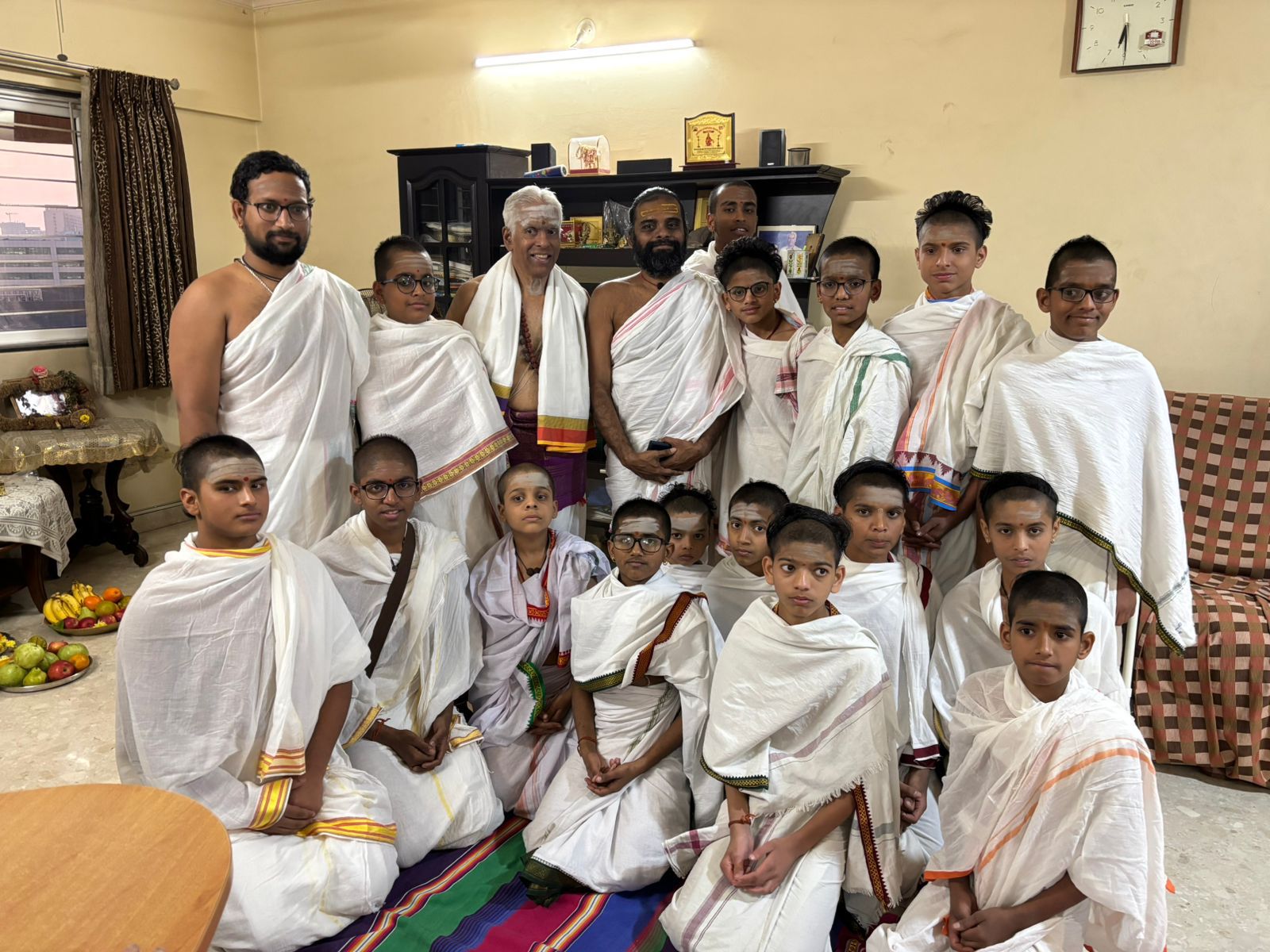
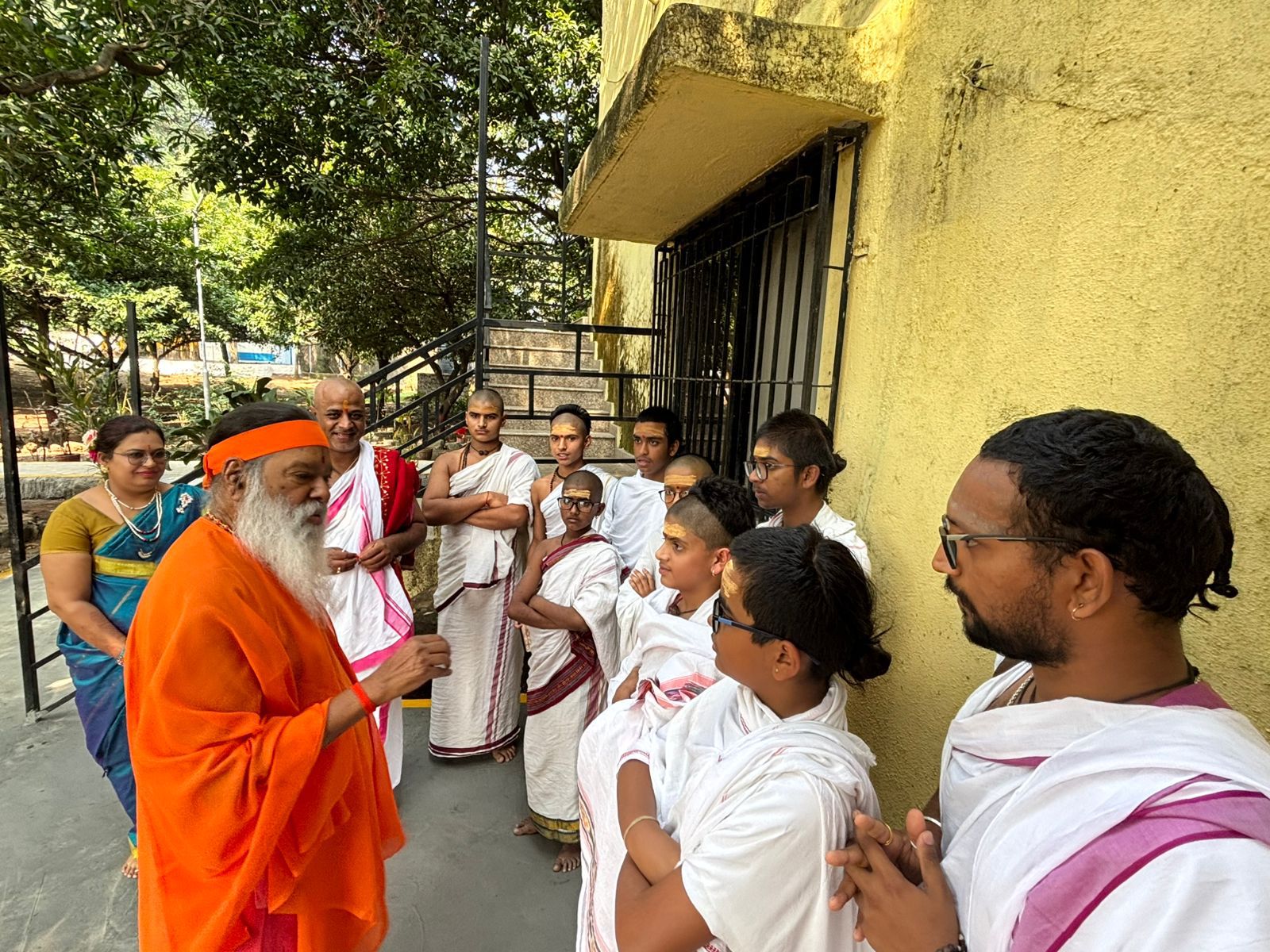
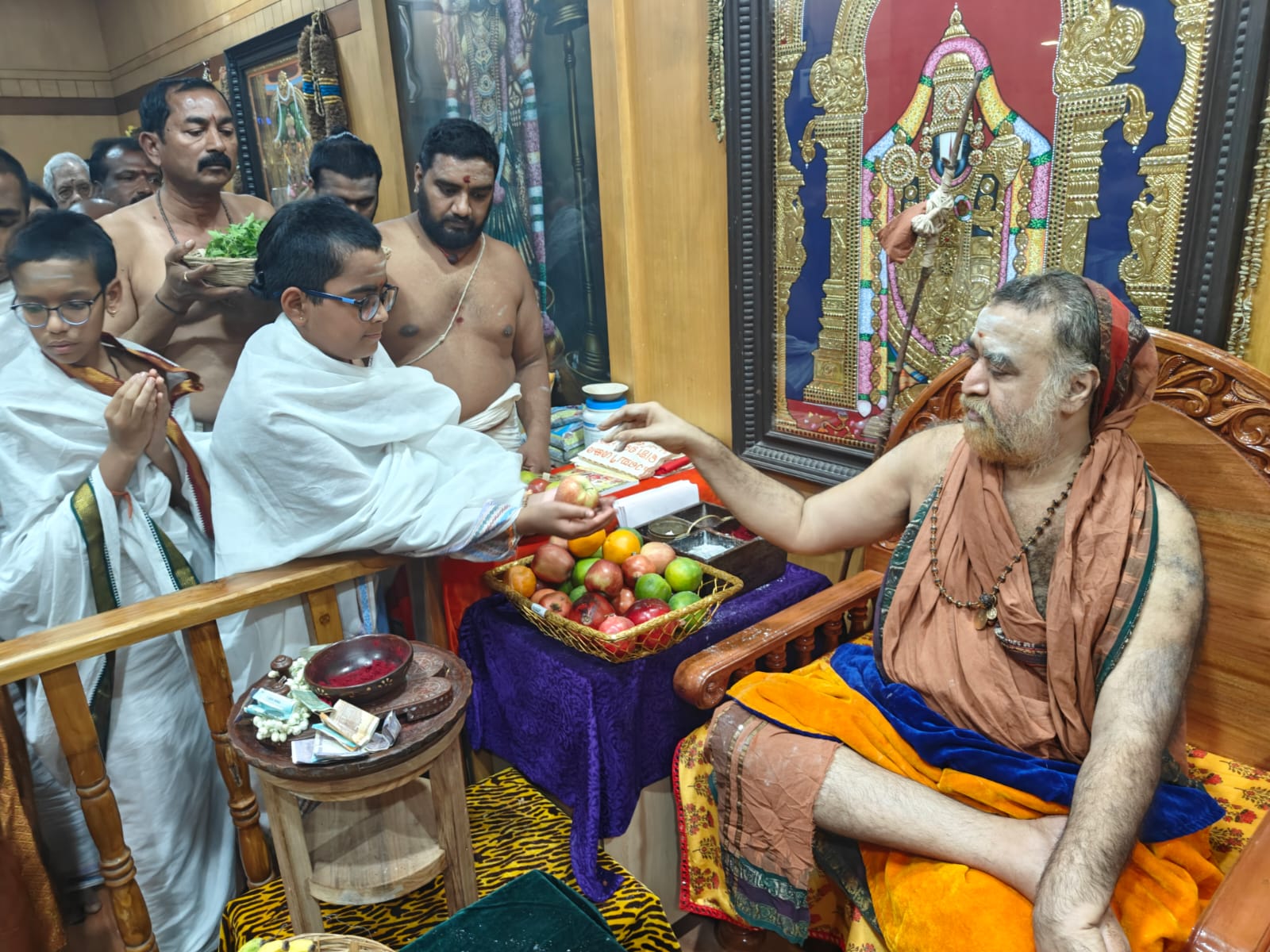
By the divine grace of Vishwavidhata Parameshwar and with the blessings of Jagadguru Pujyashri Shankara Vijayendra Saraswati Shankaracharya Swamiji of the Moolamnaya Sarvagnya Peetha, Kanchimath, the Chaitanya Veda Pathshala was established in 2019. Dedicated to the noble mission of Veda Vidya Dana (dissemination of Vedic knowledge), our Gurukula strives to preserve, protect, and re-implement the timeless values of Sanatan Dharma.
Our Mission
Rooted in the Vedic tradition of our sages, the Gurukula aims to utilize the profound wisdom of Vedic sciences for the holistic welfare of humanity, agriculture, animals, and the environment. By nurturing this ancient knowledge, we are committed to sustaining the essence of Dharma and enriching future generations with its invaluable teachings.
Education and Activities
At Chaitanya Veda Pathshala, we impart comprehensive Vedic and Sanskrit education, including:
- Krishna Yajurveda Ghananta Studies
- Rigveda School Curriculum
- Vedic Rituals and Practices: Shrauta, Darsha Poornima Maas Chaturmaasya Yagna, Somayaga, Ganesha Yagna, Chandi Yagna, Rudra Yagna, Murti Prana Pratishtha, and Shodasha Samskaras (Sixteen Householder Rites).
- Sanskrit Grammar and Literature: Paninian Grammar, Laghu Siddhanta Kaumudi, and Vedic Grammar.
- General Education: English and Mathematics for a well-rounded foundation.
Our dedication to Vidya Dana Sankalpa ensures that students receive holistic education, combining spiritual and worldly knowledge.
Our Community
The Pathshala is currently home to fifteen students, guided by two dedicated Adhyapakas (teachers) for Vedic education and a Vedanta Guruji for Sanskrit, English, and Mathematics. The students are nurtured under the loving care of Guru Mata, who ensures their well-being and addresses all non-academic needs with maternal affection.
Inspired by Tradition
Our Gurukula follows the timeless model of education practiced by great personalities like Prabhu Ramachandra, Gopalakrishna, and other divine avatars, who imbibed wisdom in similar settings.
We are devoted to upholding the sanctity of Vedic traditions while preparing students to embody these values in service of society.
Our Teachings
What We Teach In Our Gurukul
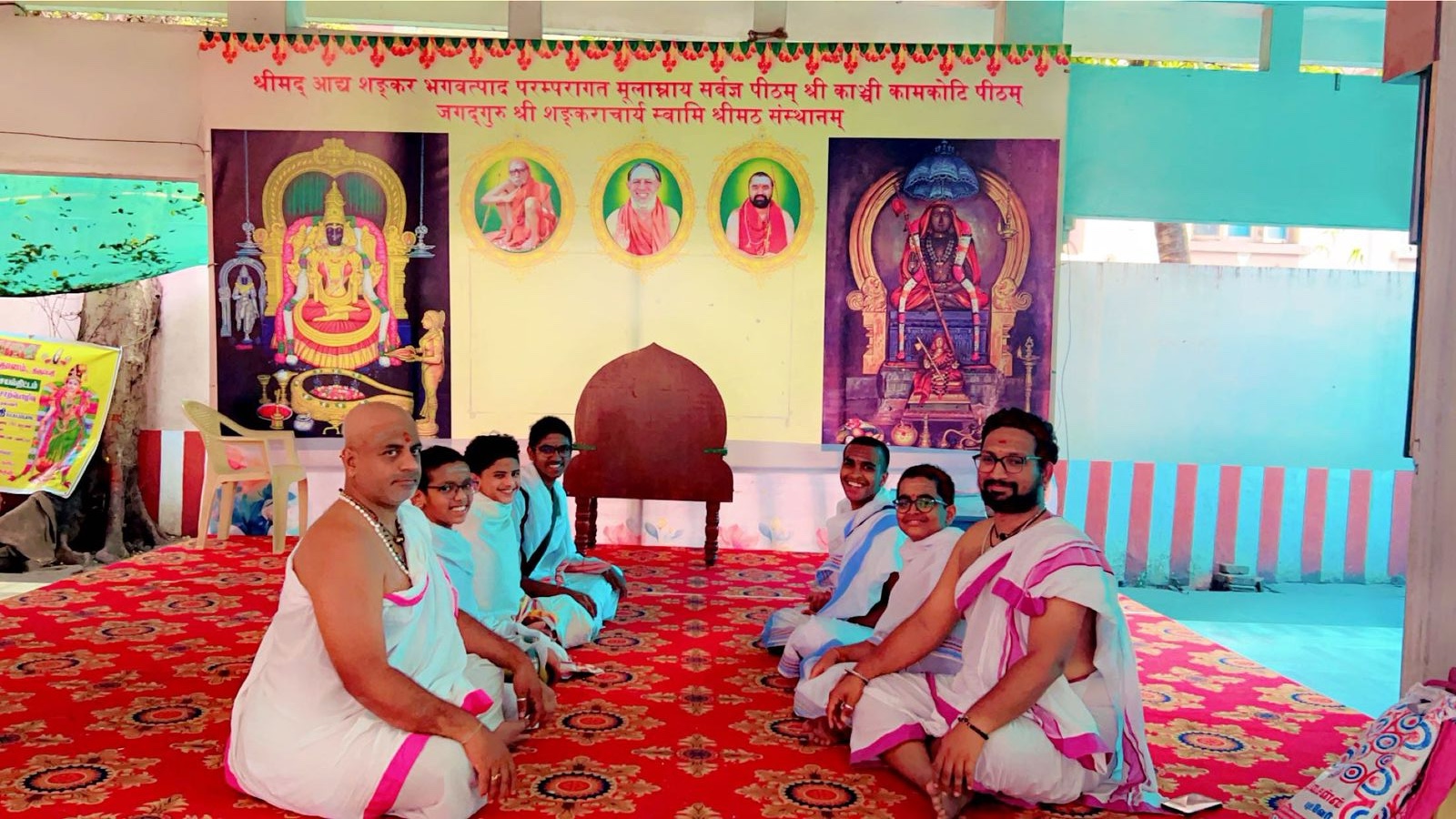
Vedic Studies
At the Gurukul, the teaching of the Vedas is at the heart of the educational journey, where students are immersed in the timeless wisdom of these ancient texts. The Vedas, the foundational scriptures of Hinduism, are imparted through a rigorous and disciplined approach, where students learn not only the Sanskrit language but also the deeper philosophical, spiritual, and ritualistic aspects embedded in these sacred texts. Through the guidance of esteemed scholars and teachers, students study the four Vedas—Rigveda, Yajurveda, Samaveda, and Atharvaveda—learning their hymns, mantras, and their application in various sacred rituals like Yajnas. The emphasis is on memorization, correct pronunciation, and understanding the essence of the mantras, ensuring that students develop a deep reverence for the sacred knowledge contained within them. This thorough education in the Vedas not only preserves the ancient traditions but also nurtures future scholars who will carry forward the wisdom of Sanatan Dharma and play a pivotal role in guiding society toward spiritual growth and righteousness.
Yagnas
Yajna Karmas (Sacrificial Rituals) are ancient Vedic rituals that form an essential part of Hindu spiritual practice, designed to invoke divine blessings, purify the environment, and establish harmony between humans, nature, and the cosmos. Rooted in the sacred texts of the Vedas, especially the Rigveda, Yajurveda, and Atharvaveda, these rituals involve the offering of various sacred materials such as ghee, grains, herbs, and specific prayers into a consecrated fire (known as the Agni). Through these offerings, practitioners seek the grace of deities and the fulfillment of various spiritual, material, and social goals.Yajna Karmas serve as a way of preserving the cultural and spiritual heritage of the Vedic traditions, passing on the wisdom of the ancients to future generations. Through these sacred rituals, the Gurukul hopes to continue its mission of imparting knowledge about these time-honored practices to the next generation of scholars, fostering a deep connection with the eternal principles of Sanatan Dharma.


Yoga Practice
At the Gurukul, yoga practice is an integral part of the curriculum, fostering physical well-being, mental clarity, and spiritual growth among students. Rooted in ancient Vedic teachings, yoga is not merely seen as a physical exercise but as a holistic discipline that unites the body, mind, and spirit. Students engage in daily asanas (physical postures), pranayama (breathing techniques), and meditation, all aimed at cultivating discipline, concentration, and inner peace. This practice helps students develop strength, flexibility, and endurance, while also honing the ability to focus and connect with their higher self. Through regular yoga practice, students of the Gurukul learn the importance of balance and self-control, equipping them with the tools needed for both academic excellence and personal transformation, in line with the timeless values of Sanatan Dharma.
Goseva
At the Gurukul, Goseva (the service and care of cows) holds a revered place in the spiritual and educational practices of the students. Rooted in ancient Vedic traditions, cows are considered sacred symbols of abundance, non-violence, and compassion. Students actively participate in Goseva as part of their daily routine, which involves feeding, bathing, and providing general care for the cows. This practice is not just about animal welfare; it is a way to instill values of selflessness, humility, and respect for all living beings. Through this nurturing service, students develop a deeper connection with nature and learn to honor the sanctity of life, reinforcing the principles of Ahimsa (non-violence) and Dharma (righteousness). The act of Goseva also teaches the students the importance of stewardship, compassion, and gratitude, aligning them with the holistic, ethical teachings of Sanatan Dharma.
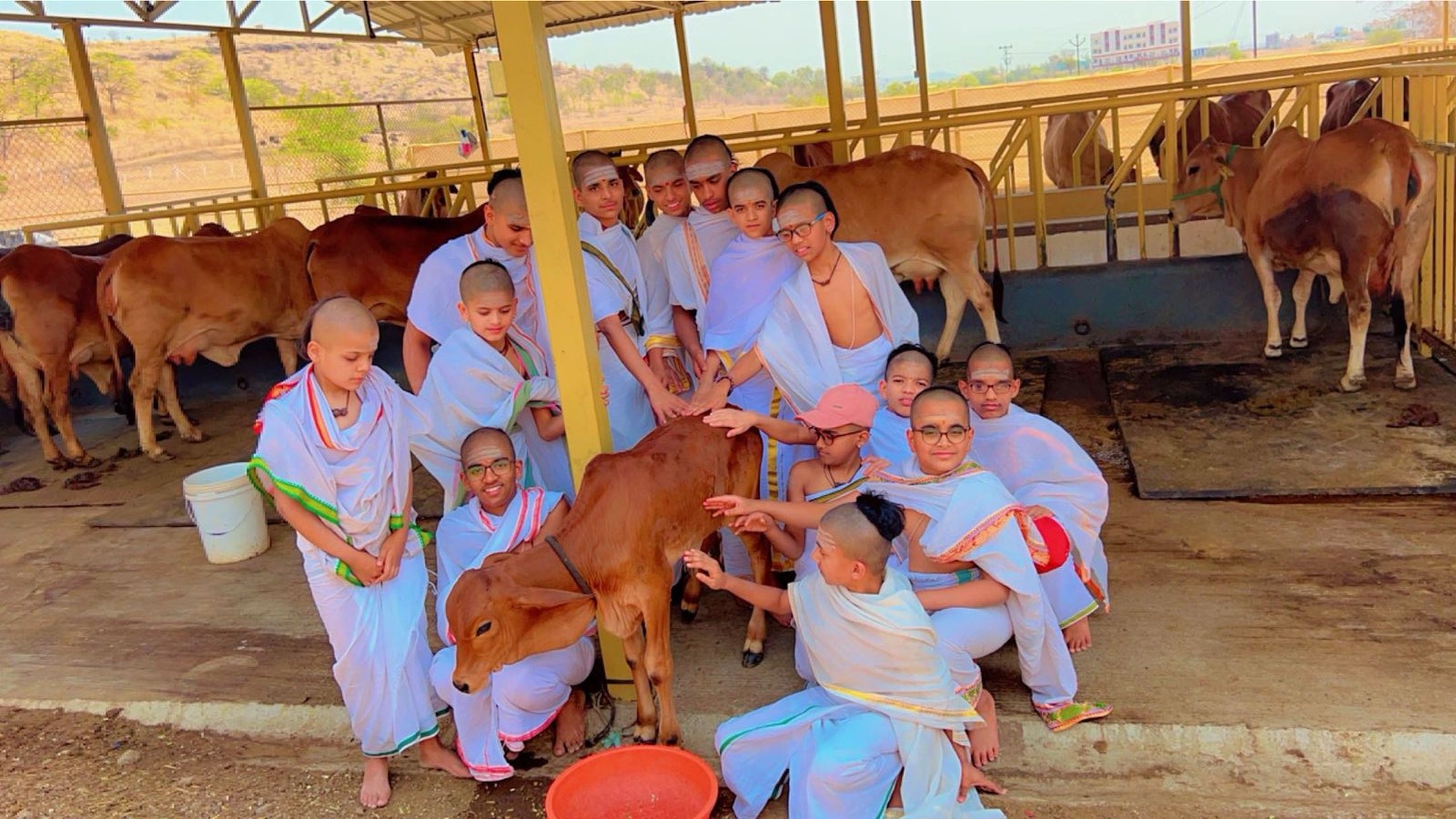
Team
Meet our honourable management committee

Shri Ve. Mu. Mangesh Bavikar Guruji
Chairman

Shri Ve.mu. Vaibhav Dage Dave Guruji
Vice-Chairman

Pritesh Davalbhakt Guruji
Secretary
Contact Us
Let's get in touch. Send us a message